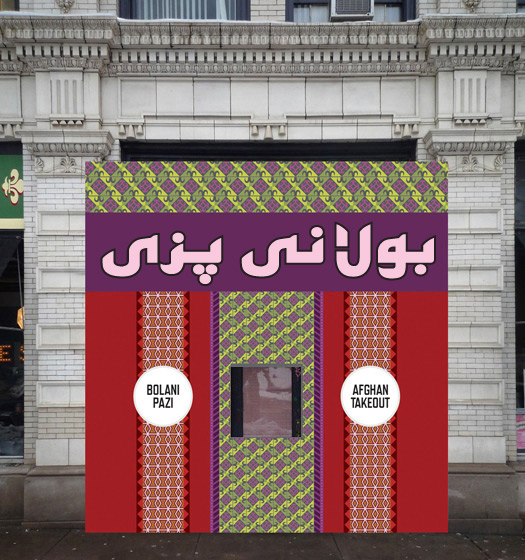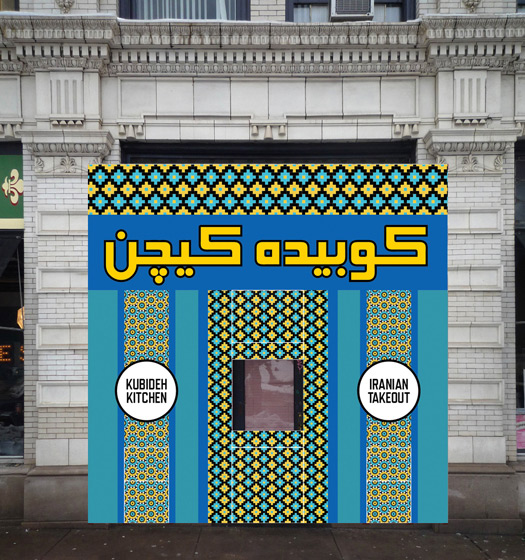
Bolani Pazi: Conflict Kitchen's new Afghani iteration. Facade design: Brett Yasko
Four months ago, a group of artists associated with Carnegie Mellon University launched an experiment to spark conversations about countries at odds with the United States. In Pittsburgh’s East Liberty neighborhood, they set up Conflict Kitchen, a take-out restaurant promoting culinary and cultural diversity. Opened with offerings of Iranian food, the venue is about to become an Afghani restaurant with a new name, a fresh menu and an updated facade. The national focus is planned to change at least twice more before the project comes to an end.
“In contrast to the polarizing effect of broadcast media, we’ve sought to create a platform which can support a more subtle exchange of culture and politics," notes Dawn Weleski, a multidisciplinary artist wiht a performance bent, who co-founded the project with Jon Rubin and John Peña. "With food as a mediator, it becomes easier for customers to consider the everyday life of people — they become responsive in a different way and consider more nuanced perspectives. They start to consider the people and culture behind conflicts [that are conducted] at a government or military level.”
The newest Conflict Kitchen, Bolani Pazi, offers the popular Afghani street food bolani. The stuffed flatbread will come in a choice of four fillings — pumpkin, potato and leek, spinach or lentil — topped with a dollop of yogurt. Food wrappings will be printed with comments by Afghanis on topics in popular culture and politics. “This forms a starting point to conversations, and we deliberately include contrasting and diverse opinions to highlight the complexity of culture,” Weleski says. Rubin, an artist who explores the social dynamics of public places, observes, "I’ve watched a Japanese Buddhist and a Muslim start to chat from the takeout window. They ended up in a rich exchange of experiences and perspectives on food, spirituality, rituals and symbolism.”
 Kubideh Kitchen: Conflict Kitchen's original Iranian version. Facade design: Brett Yasko
Kubideh Kitchen: Conflict Kitchen's original Iranian version. Facade design: Brett Yasko
According to Rubin, Conflict Kitchen creates a space for civil(ized) discourse. “Difference doesn’t require us to be damning. We’re keen to encourage dialogue which doesn’t blame or accuse and may be driven by curiosity rather than media-prescribed positions.” Along with food, he sees music as an easy point of cultural access. He's planning an online archive for sharing American and Afghani tunes. Also in the works: a live video feed between the takeout window in Pittsburgh and a hotel lobby in Kabul.
The venue is staffed by 12 people during weekday lunchtime sessions and late nights on Friday and Saturdays. Weleski trains the workforce in food preparation and conversation hosting. How to handle contentious topics and tricky questions is covered through role play. “It’s not just about inviting people to talk to us but also encouraging interaction between customers," she says. "I remember one woman who had a Pennsylvanian Dutch mother and a Persian father and spoke of the cultural tension this could create....Once these kinds of discussions start happening, people begin to expand their personal insights into social ones and appreciate similarity and difference in a new way.”
Such collisions will be harder to come by with the new incaration: "Afghanis in Pittsburgh are few and far between," Rubin points out. The UN is helping track down Afghani communities in the U.S. for possible collaborations. And Beyond the 11th, an organization started by two 9/11 widows to support Afghani women who have lost husbands in the war, have been in touch. Another problem is Pittsburgh's climate: as the cold weather sets in, lively exchanges among customers at the takeout window are bound to be curtailed.
After its Afghani phase, Conflict Kitchen plans to turn North Korean and then Venezuelan. Its founders are also considering an offshoot that focuses on countries involved in border conflicts. Feuding states such as India and Pakistan might find a correlative in a food truck or an annex to an existing restaurant. As one customer noted of the initiative on Conflict Kitchen's Kickstarter page, “It’s a delicious way to learn about becoming more human.”
